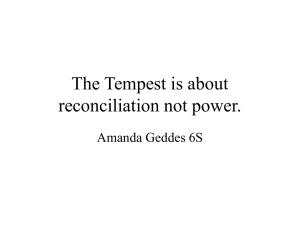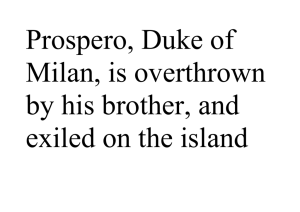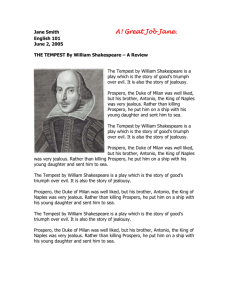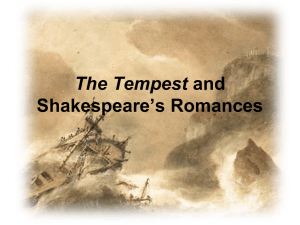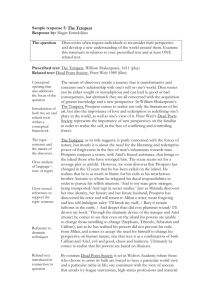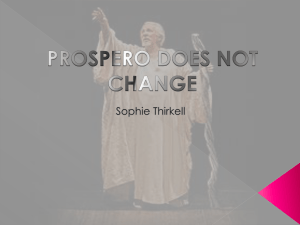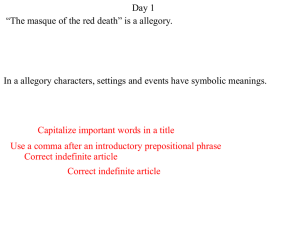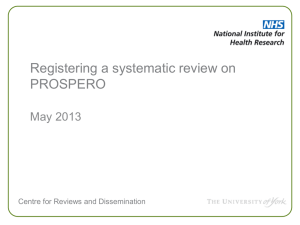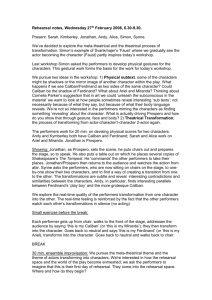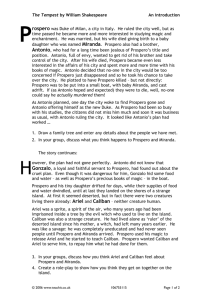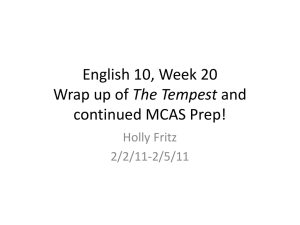Act Five scene one
advertisement
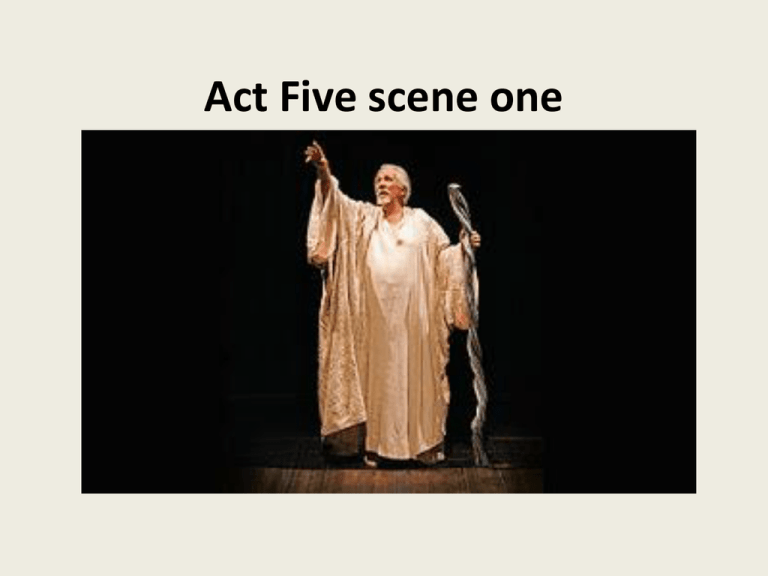
Act Five scene one Unity of time • How does Shakespeare create a sense of events coming to a head? (Look back at Act One, scene two lines 240-1) Prospero’s Power • What are the symbols of Prospero’s power in the play? • What other methods does Shakespeare use to emphasise his power at the start of this scene? AO2 – analysis of language, structure and form The sea-change (ref Act One scene two line 401) • In what ways has Prospero undergone a “seachange”? • What evidence can you find from the scene that Prospero genuinely believes that “the rarer action is in virtue than in vengeance” (line 27-8)? • How does Shakespeare remind us that Prospero’s anger still exists and is quite close to the surface (e.g. line 75)? • How might the image of the shore (79-82) reinforce the symbolic importance of the sea change? AO2 – analysis of language, structure and form Prospero promises to give up his magic arts – lines 33 - 57 Read and annotate the passage carefully. How does Shakespeare create a sense of gravitas (seriousness) in this speech? Read the critical essay Prospero – a Renaissance magus Discuss in pairs: based on the arguments put forward in the essay and your understanding of the play, is Prospero a force for good or evil? AO3 – alternative interpretations of Prospero Reactions to Prospero – lines 104 171 • How does Shakespeare show that Alonso’s penitence is real? • How does Shakespeare show that Antonio and Sebastian are unrepentant? • How does Shakespeare remind us that Antonio’s crime is greater than Sebastian’s? • Does their behaviour prevent the play from having a satisfactory comic ending? (You might like to consider the role of Don John in Much Ado About Nothing here) AO2 – analysis of language, structure and form What is the symbolic importance of the game of chess? Ideas to consider: - What is the object of chess? Is this moment a symbol of the capture of Alonso? - Does it imply that Miranda and Ferdinand’s union is purely strategic? - Is it a metaphor for the difficult series of manoeuvres that Prospero has successfully pulled off? - Is it an image of Miranda and Ferdinand as the rulers of a new and better society? - Is it an image of domestic harmony and sexual equality? AO2 -Analysis of language, structure and form AO3 – alternative interpretations Unity of Place • What is the symbolic importance of having all the characters on stage for the first time? • What is the strategic importance of the union between Miranda and Ferdinand? (e.g. 205 – 6) AO2 – analysis of language, structure and form AO4 – context The restoration of order • What do you notice about the way the boatswain speaks to the nobles (lines 229 – 239)? • How is the symbolic of the wider themes of the play? • Find a quotation from Act 1 scene 1 which juxtaposes with the boatswain’s respectful speech • How does Alonso put Stephano and Trinculo back in their place? Why is this importance for the symbolic restoration of order? AO2 AO4 This thing of darkness I/ Acknowledge mine (line 275 – 6) W H Auden produced a poetic commentary on The Tempest called The Sea and the Mirror. Auden represented Caliban as Prospero’s mirrored face or secret self hidden beneath the veneers of civilised behaviour. Several productions, including an RSC one in 1982, have presented Caliban and Ariel as opposing sides of Prospero’s psyche. Read Jeremy Todd’s review of The Sea and the Mirror. What light does it shed on the symbolic significance of Caliban and Ariel? AO3 – alternative interpretations Ariel’s freedom • Look at the line (241) in which Prospero frees Ariel. Why do you think Ariel doesn’t reply? • Director Sam Mendes had Ariel spit at Prospero after he had been granted his freedom. Although reviews of the production were largely positive, many critics reacted negatively to the spitting. Why do you think this is? Do you agree? AO3 – alternative interpretations The end of the scene • What is Prospero’s final use of magic? How does this contrast with the opening of the play? • Why is it significant that Ariel is still on stage? • Look at Prospero’s term of address (“My Ariel, chick”). How do you respond to it? • Why is it important that the scene ends with all the noble characters on stage? AO2 – analysis of language, structure and form The Epilogue • In what ways does the epilogue relate Prospero’s art to the dramatist’s skill? Go through the epilogue and annotate all the words and phrases that could apply to either Prospero or Shakespeare. Homework Essay By the end of The Tempest, magic and wonder have given way to a human resolution. Evaluate this view by exploring the dramatic effects of the play.
